10 Free Collaboration Tools for Startups (2025) | Boost Team Productivity

In the modern business environment, which is fast-paced, startups require collaboration tools which are appropriate to startups. Such tools assist the teams to collaborate even miles apart. Being a startup, new business owner, or part of a continuously growing startup, it immensely helps to have good collaboration tools in a startup because it can change the way the entire team communicates and gets work accomplished.
The best part? It does not require lots of funding to start with! There are lots of spectacular startup collaboration tools with free plans, which are rich in features. These free tools allow you to plan efforts, communicate with colleagues, share documents as well as monitor loyalty without investing a single cent.
Our article shall discuss ten of the Collaboration Tools for Startups use without incurring any costs. These can assist your team to be better organized, communicate well and work more efficiently. Messaging applications to project management solutions, we have everything to cover to the top free start-up collaboration tools in 2025.
Why Startups Need Collaboration Tools for Startups
- Better Communication: Startup collaboration tools establish the paths on which teams are able to discuss, exchange ideas and solve in less time.
- Remote Work Support: As the teams can work remotely, such tools ensure they stay in touch with one another and are on the same wavelength.
- Save Money: Free tools in collaboration technology startups are used to save the cost of purchasing and exposure to professional features as well.
- Increased Productivity: Once it is all in a single location your crew hardly wastes time and accomplishes more.
- Easy File Sharing: These tools can enable you to share files, pictures, and documents in real-time without the untidy email messages.
- Track Progress: You can know what all people are doing and keep the projects on schedule.
Key Features to Look for in Free Collaboration Tools
- User-Friendly Interface: The product must be user-friendly and simple to acquire, including individuals that are not very technological.
- Real-Time Updates: All people should read changes and messages immediately to continue working without any delays.
- File Storage: Find solutions that will allow you to store and share documents without exposing them to any serious risks.
- Integration Options: It is good collaboration tools that work well with existing apps, and they are used by startups.
- Mobile Access: Your office ought to be equipped with the ability to work through phones and tablets and not computer only.
- Security Features: Ensure that your business information is in safe possession, using enhanced security measures and privacy.
Comparison Table of Free Collaboration Tools for Startups
| Name | Best For | Key Features | Pricing |
| Slack | Communication | Messaging, channels, integrations | Free (limited history); Pro $7.25/user/month |
| Trello | Organization | Kanban boards, task cards, workflows | Free; Premium $5/user/month |
| Google Workspace | Documents | Real-time editing, 15GB storage, Gmail | Free; Business $6/user/month |
| Zoom | Meetings | Video calls, screen share, recording | Free (40-min limit); Pro $14.99/user/month |
| Asana | Projects | Task management, multiple views, tracking | Free (up to 15); Premium $10.99/user/month |
| Microsoft Teams | Integration | Chat, video, Office integration | Free (60-min calls); Paid $4/user/month |
| Notion | Workspace | Notes, databases, wikis, templates | Free; Business $10/user/month |
| ClickUp | Productivity | Tasks, time tracking, multiple views | Free; Business $12/user/month |
| Miro | Brainstorming | Digital whiteboard, templates, real-time | Free (3 boards); Team $8/user/month |
| Dropbox | Storage | File sync, sharing, 2GB storage | Free; Plus $9.99/user/month |
Top 10 Free Collaboration Tools for Startups (2025)
1. Slack
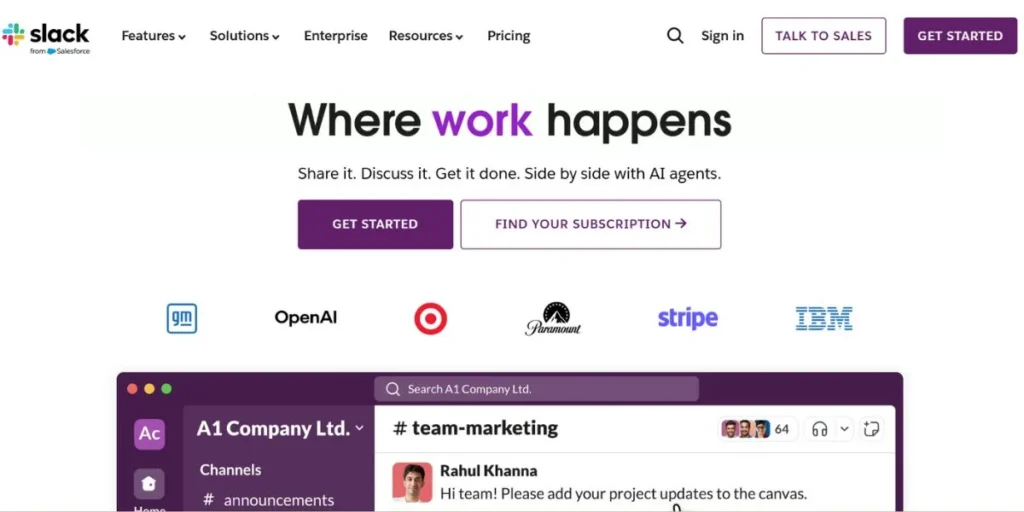
- Rating: 4.5/5
- Best For: Communication
Slack is among the most trending Free Collaboration Tools for Startups across the globe. It establishes an online working environment through which your workforce can communicate instantly, exchange files, and separate discussions into various categories.
The same channel has the capability of specializing in a project, department, or subject, and thus it becomes extremely easy to locate information in future. Slack can be used on computers through Phones and even on tablets hence, your team is able to be connected at any point.
Key Features:
- Live chat networks.
- File sharing capabilities
- 2,200+ app integrations
Pros:
- Very easy to use
- Excellent search function
- Great mobile apps
Cons:
- Message history limited
- Can become distracting
- Video calls are basic
Website Link: https://slack.com
2. Trello
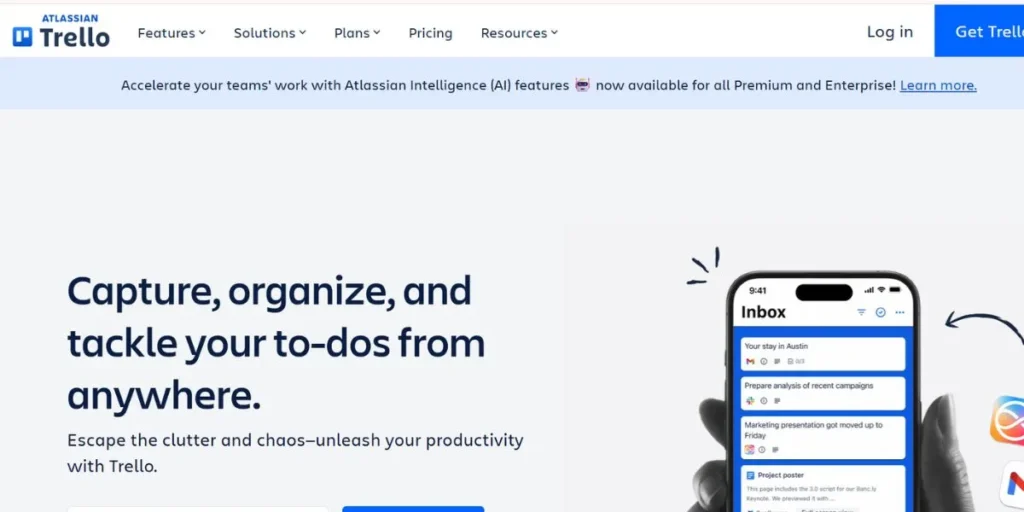
- Rating: 4.6/5
- Best For: Organization
Trello incorporates card and board system, which is a very straightforward way to visualize the projects management, but more enjoyable. Imagine such sticky notes on a computer board but more powerful. Cards indicate the workload, and you can arrange cards between various columns (such as To Do, Doing, Done, etc.) in order to reflect the progress.
Trello is very versatile and suits the purposes of tracking products launches, or even content calendar very well. You are able to add new team structures to cards, post due dates, attach files and comments.
Key Features:
- Kanban-style visual boards
- Customizable task cards
- Team work characteristics.
Pros:
- Tremendously easy to use interface.
- Flexible for projects
- Great visual organization
Cons:
- Limited free features
- Can get messy
- Basic reporting tools
Website Link: https://trello.com
3. Google Workspace

- Rating: 4.7/5
- Best For: Documents
Seamless operation of these tools is unique to Google Workspace and the user experience of the combined tools is unmatched.Free Collaboration Tools for Startups Docs, Sheets, and Slides allow multiple people to work on the same document at the same time and you are able to see all the changes made by others immediately.
Your data is totally safe in the cloud and you can access it anytime. The free plan will give you 15GB of storage which is sufficient for most small businesses.
Key Features:
- Document collaboration on the fly.
- Cloud storage of 15GB
- Email service integrated
Pros:
- Compatible with different devices
- Feature of automatic saving
- User-friendly
Cons:
- Storage gets filled up fast
- Concern about privacy issues
- Internet connection required
Website Link: https://workspace.google.com
4. Zoom
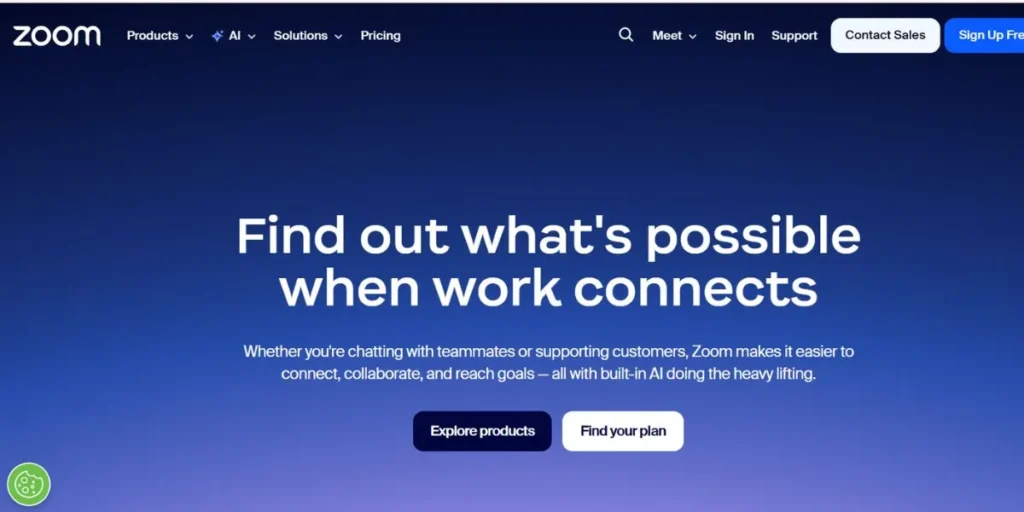
- Rating: 4.5/5
- Best For: Meetings
Zoom became a regular name of video-meetings, and it is one of the most suitable Collaboration Tools for Startups which should communicate face-to face. The free plan allows hosting unlimited one-on-one meetings and group meetings up to 40 minutes, which is ideal to quickly check-in colleagues as well as conduct a client call.
Free Collaboration Tools for Startups Even with low-speed internet connections, the video and audio quality are of high standards. You are able to screen share, record meetings, virtual backgrounds and to make breakout rooms to hold smaller group discussions.
Key Features:
- HD video conferencing
- Screen sharing capability
- Meeting recording option
Pros:
- Excellent video quality
- Easy to join
- Good mobile experience
Cons:
- 40-minute meeting limit
- Can drain battery
- Security concerns reported
Website Link: https://zoom.us
Read my next blog:- Virtual Classroom Software
5. Asana

- Rating: 4.4/5
- Best For: Projects
Asana is an extremely powerful software that can manage projects very effectively, so it is a real helper for start-up companies in the planning, organizing and tracking of work. You can create a project and then break it down into tasks, and you can delegate some of those tasks to other people and set a deadline for them.
With Asana you can see your work in lists, boards, calendars or timelines, and it is up to each one to visualize the whole picture and know what he is responsible for. The free plan allows only up to 15 users to use it, but they can create unlimited tasks, projects and send unlimited messages. The simplicity of Asana is one of its benefits as it helps keep everything neatly ordered through the system.It’s one of the best free collaboration tools for startups.
Key Features:
- Multiple ways of viewing projects.
- The feature for assigning tasks
- Tools for checking progress
Pros:
- Highly organized layout
- Suitable for staff
- Thorough task management
Cons:
- Requires time to learn
- Might be too much at times
- Not many free integrations available
Website Link: https://asana.com
6. Microsoft Teams

- Rating: 4.5/5
- Best For: Integration
Microsoft teams incorporate all chat, video calls, file storage and combine it with application integration into a single platform. Even more benefiting is that using Microsoft products is already better, as it is compatible with Word, Excel, PowerPoint, and OneDrive. The free is unlimited chat and 60 minutes of a video call and storage of 5GB of files.
Teams has a straightforward structure of organizing chats similar to Slack and they are simple to divide subjects into. It is also possible to add colleagues, exchange files in chats and make documents without the need to move out of the application. It’s one of the best free collaboration tools for startups.
Key Features:
- Chat and video combined
- Microsoft integration is not an obstacle.
- Channel-based organization
Pros:
- All-in-one platform
- Works with Office
- Strong security features
Cons:
- Can be complex
- Needs a Microsoft account
- Interface feels cluttered
Website Link: https://www.microsoft.com/en-us/microsoft-teams
7. Notion
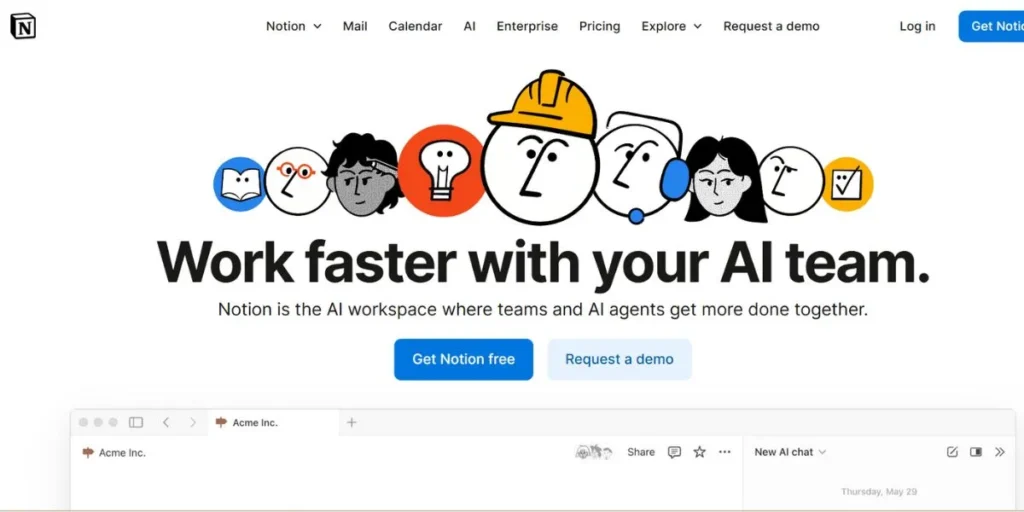
- Rating: 4.6/5
- Best For: Workspace
Notion is described as a digital Swiss Army knife of startups. It brings together taking notes, managing tasks, databases, wikis and Calendar into a single flexible work environment. All facets of a company, such as wikis, project road maps and meeting notes and document libraries, are made in Notion.
Its true magic is achieved when it is tailored to suit your team in their very created way. You are allowed to create templates, connect various pages with each other, and integrate the other tools. Notion has a complimentary free plan whereby they have unlimited pages and blocks to small teams.It’s one of the best free collaboration tools for startups.
Key Features:
- All-in-one workspace design
- Templates that can be customized.
- Database and wiki
Pros:
- Extremely flexible tool
- Beautiful, clean design
- Great for documentation
Cons:
- Steep learning curve
- Can be slow
- Mobile app limited
Website Link: https://www.notion.so
8. ClickUp

- Rating: 4.6/5
- Best For: Productivity
ClickUp is determined to be your replacement of all other productivity systems in a single platform. It has task management, documents, objectives, time management, calendars, and even emails inbox. The free forever plan is unexpectedly rather rich, as it is allowed to include an unlimited number of tasks and members.
It’s one of the best free collaboration tools for startups. You have more than 15 options that will display your work whether as a simple list or in an elaborate account of the Gantt charts. Admittedly, ClickUp also has in-built time tracking, thus, expressing how long things actually take.
Key Features:
- Multiple view options
- Built-in time tracking
- Unlimited tasks allowed
Pros:
- Very feature-rich
- Highly customizable
- Great free plan
Cons:
- Can feel overwhelming
- There is over- notification.
- Mobile app slower
Website Link: https://clickup.com
9. Miro
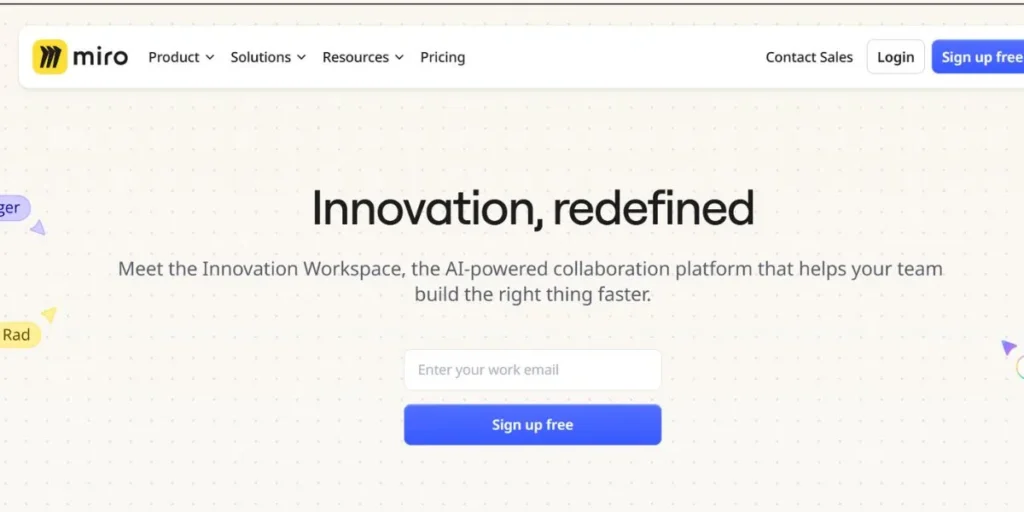
- Rating: 4.5/5
- Best For: Brainstorming
Miro provides an endless, digital whiteboard, on which teams can brainstorm, sketch, and shape out on. It suits best with the startup condition to visualize the ideas, create flowcharts, create user experiences or participate in virtual workshops.It’s one of the best free collaboration tools for startups.
You can add sticky notes, drawing diagrams, and uploading pictures in the notebook, or even templates prepared that are associated with such an ordinary task as SWOT analysis or sprint planning. It is possible to have multiple members in the same board operating and monitor the other cursors in time.
Key Features:
- Infinite white board on the computers.
- Team work mode Real time.
- Pre-made template library
Pros:
- Great for creativity
- Easy to use
- Visual and engaging
Cons:
- Limited free boards
- Can lag sometimes
- Exports are limited
Website Link: https://miro.com
10. Dropbox
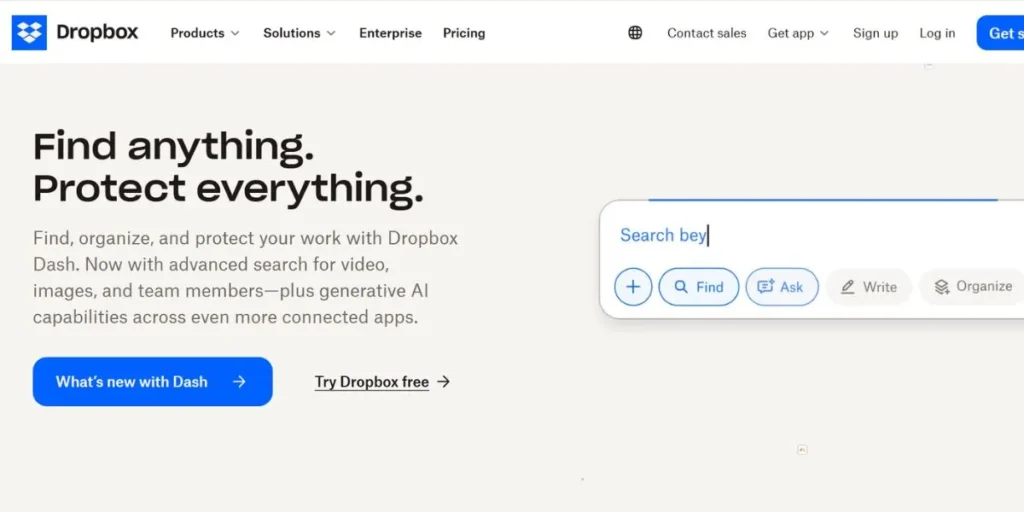
- Rating: 4.4/5
- Best For: Storage
Dropbox is among the earliest cloud storage model and is amongst the most trusted tools of collaboration to a startup in file sharing and storage. The free account does have 2GB of storage capacity that is adequate when sharing vital documents and files. It is peculiar to dropbox that it helps synchronize files across all devices in a very easy way.
It’s one of the best free collaboration tools for startups. Android works with your computer, and you can save a file and see it instantly on your phone, and your tablet. The ability to share folders with your colleagues, forward files via a link and also the offline capability of working on such files are also present.
Key Features:
- Automatic synchronisation of files.
- Easy file sharing
- Cross-device accessibility
Pros:
- Very reliable service
- Simple to use
- Excellent sync speed
Cons:
- Only 2GB free
- Expensive paid plans
- Poor collaborative capabilities.
Website Link: https://www.dropbox.com
How to Choose the Right Collaboration Tools for Startups
- Identify Your Needs: Determine your start up most in need of – messaging, project management, file sharing or video calling.
- Consider Team Size: Other tools to collaborate as a startup are easier to use in a smaller workforce, and others scale.
- Check Integrations: Ensure that the tool gets associated with other applications and services with which you use on a daily basis.
- Test Free Versions: Start off with trying out the free plans to determine whether the tool can fit your workflow.
- Get Team Input: Get your team members to tell you what they require as well as what tools they can easily make use of.
- Think Long-Term: Select collaboration tools startup, which would expand as your business does without imminent need to change at the earliest opportunity.
Tips for Implementing Collaboration Tools for Startups
- Start Small: Do not bombard your staff with too many Collaboration Tools for Startups.
- Provide Training: Be sure your team is trained well so that no one has to guess on how to utilize its tools.
- Set Clear Guidelines: Develop basic guidelines of when and how to use each of the tools depending upon the purpose.
- Lead by Example: The tools should be proactively used by managers to promote the team adoption and involvement.
- Gather Feedback: Ask your team on what is working and what is not working frequently and change accordingly.
- Be Patient: Everyone should have time to get accustomed to new collaboration tools among startups, without the rush mode.
Conclusion
The decision-making process of selecting the appropriate Collaboration Tools for Startups could enable creative changes in the way of your team functioning. The 10 free ones we have addressed sports rich features but do not cost as much. Despite the difference in the manner of Slack’s messaging or Trello of its visual structure, each of the tools in its own way gives an advantage to your startup.
It’s one of the best free collaboration tools for startups. Though, keep in mind that the collaboration tools that fit best startups are within those that are in actual use by the team. Begin with one or two tools to solve your largest trouble and be able with them, and continue on. There is nothing to be afraid of in trying out various alternatives before establishing the right fit.
These collaboration tools are developed to expand along with your startup. Most of them have cheap paid plans which they give you once you are willing. It is only necessary to start with the free versions and ensure you develop good collaboration habits early enough. As successful startups with the correct combination of collaboration tools at hand, you are going to communicate more effectively, be able to get your work accomplished in a brief time, and unprecedented marvels together by 2025 and more!
FAQs
Can small startups really work with just free Collaboration Tools for Startups?
Yes! Numerous startups have started with free startup collaboration tools and upgraded brokerage as they need certain advanced functions.
How many collaboration tools should a startup use?
Begin with 3-4 startup core collaboration tools comprising a communication tool, project management tool, file storage tool and video meetings tools.
Are free collaboration tools secure enough for business use?
The majority of trusted free collaboration applications with startups are safe, and their privacy policies should be read and security features have to be turned on.
Can I switch collaboration tools later if needed?
Yes, though it takes effort. The Collaboration Tools for Startups mostly allow exporting of data and that makes it easier to make transitions.
Do free plans have enough storage space?
For small startups, yes. Once you get bigger, you may have to pay, though startup cases have sufficient tools of free collaboration.
 Get 50% off on Vault theme. Limited time offer!
Get 50% off on Vault theme. Limited time offer!